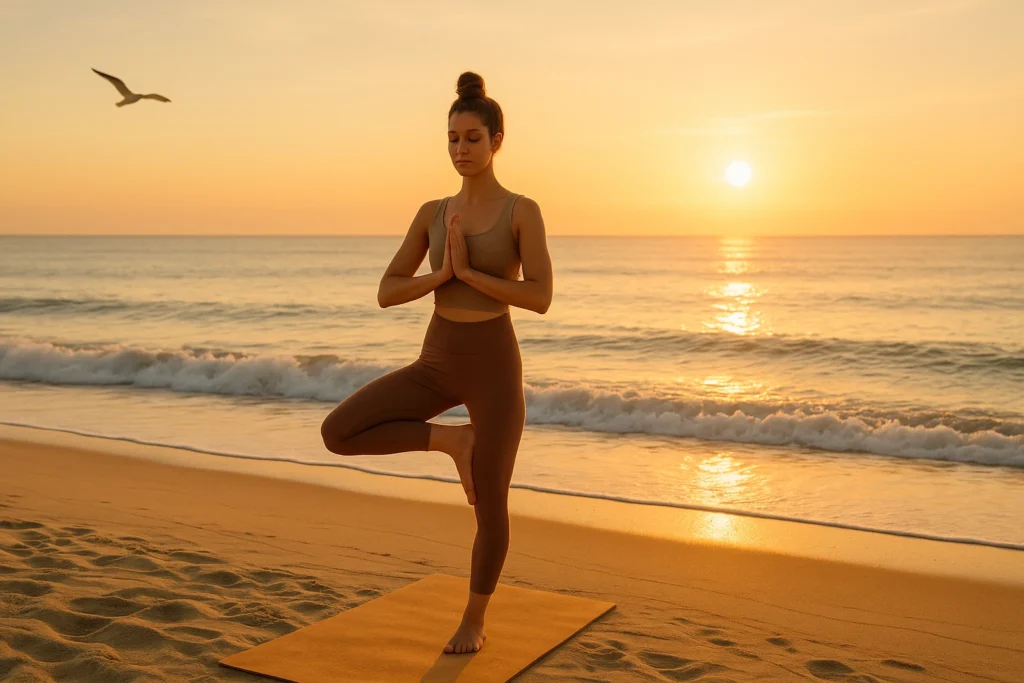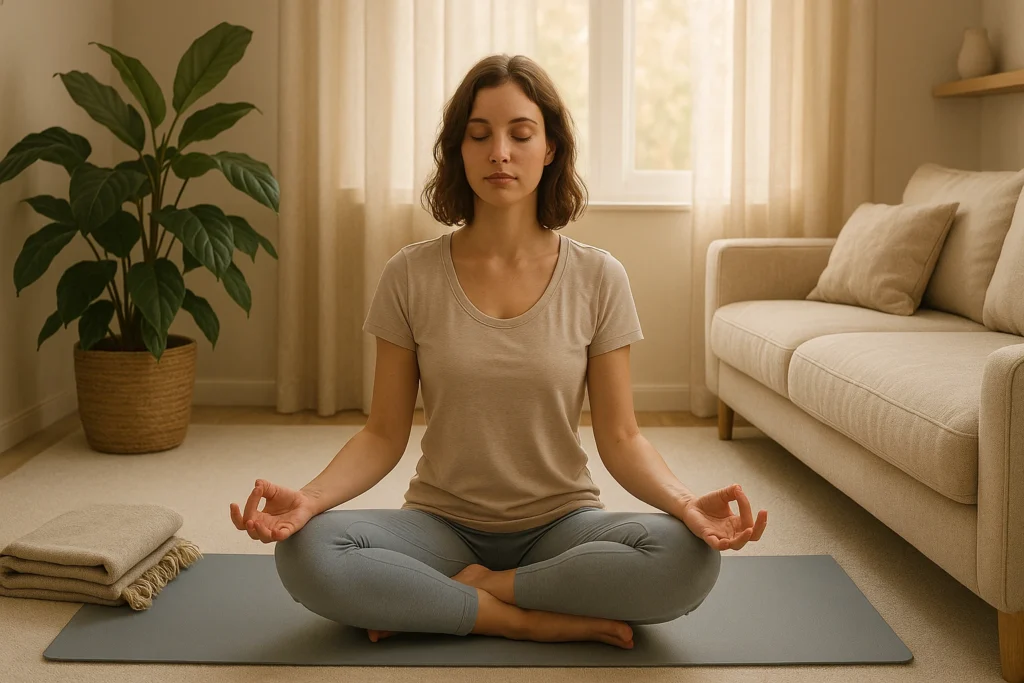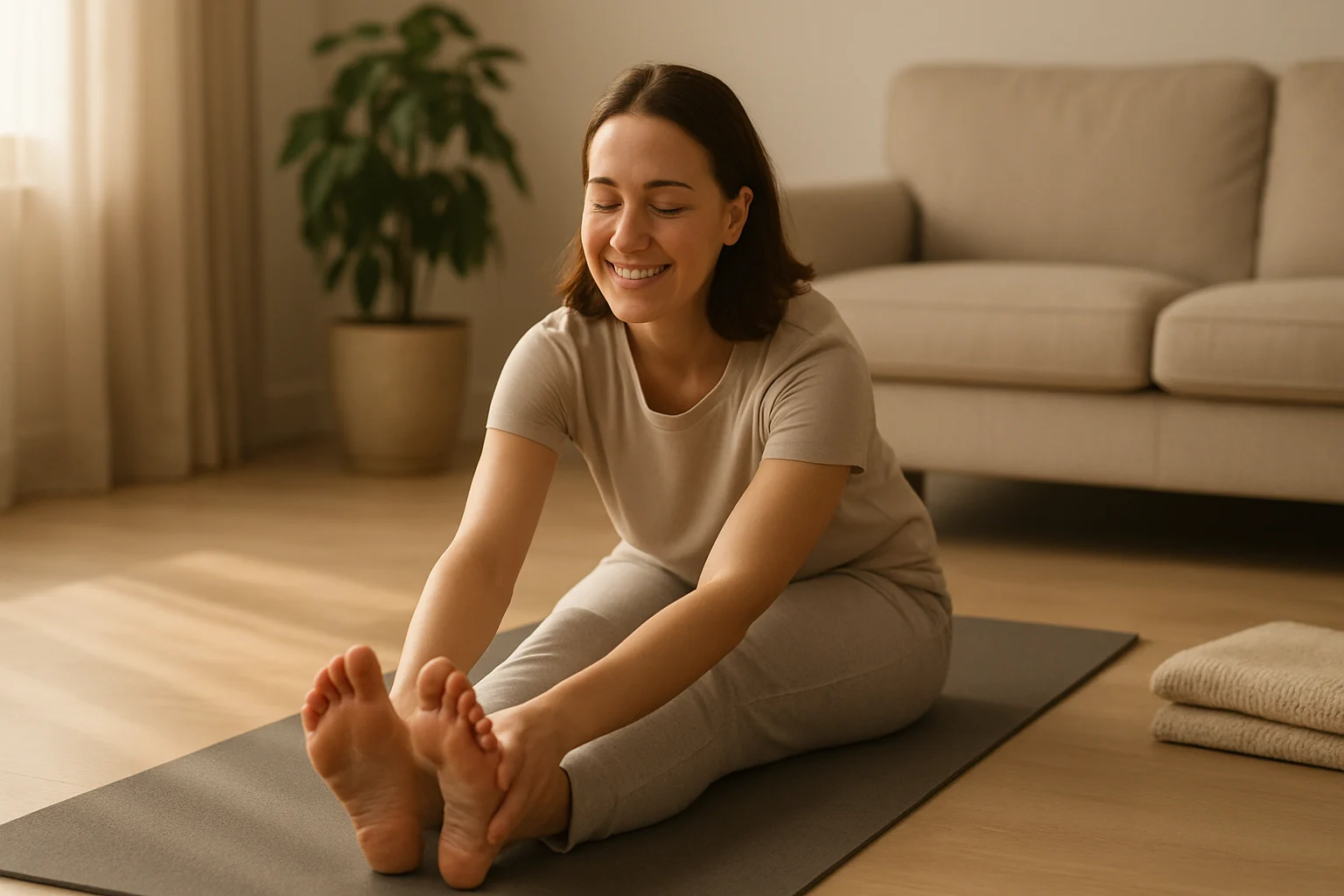
Struggling with lower back pain? If you’re new to yoga, you’re in the right place—this quick guide to yoga for lower back pain for beginners shows gentle poses you can do at home. You’ll get simple steps, calm breathing, and small wins you may notice as you practice. For a broader approach to managing body aches throughout your body, explore our yoga for pain relief. Ready to start your journey to a happier, healthier back? Let’s go! ✨
Start Your Yoga Routine Now!Table of Contents
- Key Takeaways for Yoga Beginners
- Why Try Gentle Yoga?
- Safe Start Tips
- Do You Need Special Gear for Yoga?
- Beginner-Friendly Poses for Back Relief
- Build-Your-Own Routine
- 10-Min Beginner Routine
- Progressing Your Practice
- Consistency Wins for Back Pain Relief
- When to Be Cautious with Yoga
- FAQ: Back-Relief Yoga for Beginners
- Conclusion: Your Path to Relief
Key Takeaways for Yoga Beginners
- Ease In Gently: Start with simple poses and tune into your body to avoid strain. No pain, just progress! 🧘♀️
- Strengthen Your Core: Focus on poses that build core stability to support your lower back.
- Try These Poses: Practice 4-6 easy poses like Cat-Cow and Child’s Pose for effective relief.
- Minimal Gear Needed: A comfy space and maybe a mat are enough to start.
- Stay Consistent: Short, regular sessions lead to lasting relief and better well-being. 🗓️
Why Try Yoga for Lower Back Pain for Beginners?
Yoga isn’t just stretching—it’s a mind-body practice that offers multiple benefits for lower back pain. Research and guidance from Mayo Clinic note that gentle routines can reduce back pain by improving flexibility and strength. Here’s why it works:
- Enhanced Flexibility: Beginner back-care yoga poses may help loosen tight muscles in your back, hips, and hamstrings. Think of your muscles as rusty hinges—yoga oils them up! ⚙️
- Stronger Core: Poses engage core muscles (around your abdomen and back), acting like a natural corset to support your spine.
- Improved Posture: Lower back yoga for newbies increases body awareness, helping you maintain better posture and reduce strain.
- Stress Relief: Stress tightens muscles, worsening pain. Yoga’s breathing and mindfulness, similar to techniques in yoga for stress relief, calm your nervous system. 😌
- Body Awareness: You may learn to notice what feels good, which can help reduce strain.
This post has affiliate links. We may earn a commission. Learn more.
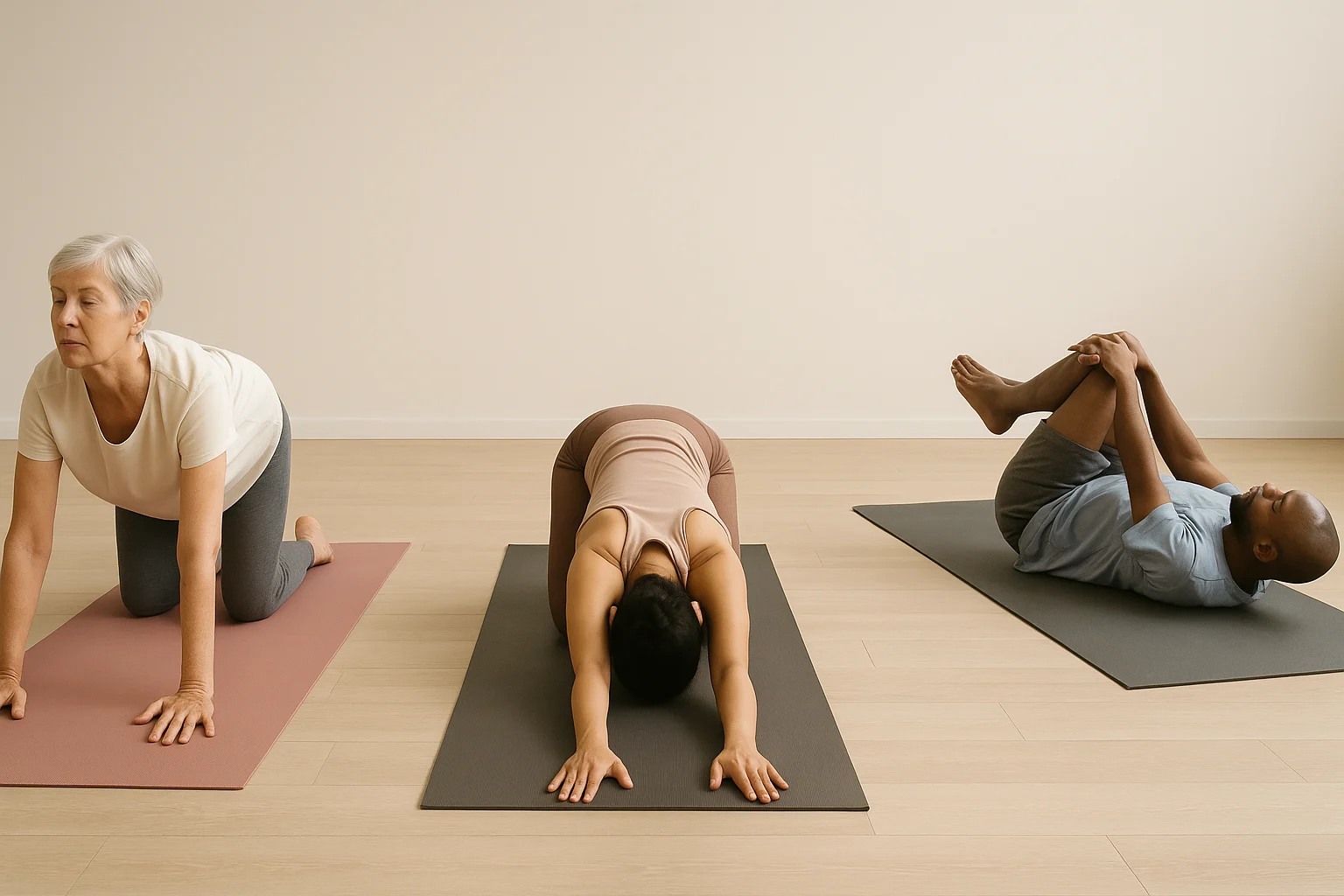
Essential Tips to Start Yoga for Lower Back Pain for Beginners Safely
Ready to get started with a beginner-friendly back-care routine? Here are my go-to tips to keep your practice safe and effective:
- Check with Your Doctor: If you have chronic or severe back pain, check with a healthcare provider first.
- Listen to Your Body: Never push into pain. Ease out of any pose that feels uncomfortable.
- Go Slow: Start with 5-10 minutes daily to build confidence.
- Breathe Deeply: Use slow, nasal breaths to relax muscles and focus your mind.
- Use Props: Blankets or cushions can make poses more comfortable.
- Practice Regularly: Short, frequent sessions trump occasional long ones.
Do You Need Special Gear for Yoga?
One perk of starting yoga for back relief as a beginner is its simplicity, much like a no-equipment yoga routine. Here’s what you need:
- Yoga Mat (Optional): A mat offers cushioning, but a carpet or towel works too.
- Comfortable Clothes: Wear stretchy, non-restrictive clothing.
- Props (Optional): Use a blanket, towel, or pillow for support. A belt or scarf can help with stretches.
You likely already have everything to start! 🥳
Gentle Yoga Poses for Lower Back Pain for Beginners
Let’s explore these back pain yoga poses that are ideal for beginners. Each targets specific muscles like the erector spinae (along the spine) or glutes. These icons show each pose’s intent:
- 🧘 Breath/Focus Pose – Calms the mind.
- 🌤️ Intro-Level Stretch – Gentle flexibility boost.
- 💪 Active Release/Stretch – Strengthens and releases.
- ⛔ Skip for Acute Pain – Avoid if injured (none here).
| Pose | Purpose | Target Muscles | Difficulty |
|---|---|---|---|
| Pelvic Tilts | Mobilizes spine, engages core | Erector spinae, abdominals | Very Easy |
| Cat-Cow | Warms spine, improves flexibility | Erector spinae, obliques | Easy |
| Child’s Pose | Stretches lower back, hips | Glutes, lower back | Very Easy |
| Knee-to-Chest | Decompresses spine, stretches glutes | Glutes, lower back | Easy |
| Supine Spinal Twist | Releases spine, massages organs | Obliques, glutes | Easy |
| Modified Bridge | Strengthens glutes, opens hips | Glutes, hamstrings | Moderate |
1. Pelvic Tilts (Gray/Yellow)
Why it helps: This beginner-friendly movement activates your core and mobilizes your lower spine, easing stiffness in the erector spinae.
How to do it:
- Get comfy on your back with knees bent, feet flat, and about hip-width apart. Let your arms relax by your sides.
- Feel the gentle curve in your lower back.
- As you breathe in, gently lift your lower back, letting your tailbone tip downward.
- As you breathe out, softly press your lower back into the mat, tilting your tailbone upward.
- Repeat 8-10 times, syncing with your breath.
Tips: Keep movements small, like tilting a bowl of water. 🥣
2. Cat-Cow (Marjaryasana-Bitilasana) (Gray/Green) — Gentle Beginner Yoga Flow
Why it helps: This flow warms the spine, stretches the erector spinae, and connects breath to movement for flexibility—perfect for beginner back pain yoga.
This is a great starter flow for easy back pain yoga. Cat–Cow demo (Mayo Clinic)
How to do it:
- Start in tabletop position: wrists under shoulders, knees under hips.
- Inhale (Cow): Drop your belly, lift your chest and tailbone, gaze forward. 🐄
- Exhale (Cat): Round your spine, tuck your chin, pull your belly in. 🐈
- Flow between poses for 8-10 breaths.
Tips: Keep your neck relaxed. Use a blanket under knees if needed.
3. Child’s Pose (Balasana) (Yellow)
Why it helps: This restorative pose stretches the lower back and glutes, calming the body—ideal for gentle back relief.
This calming pose is commonly used early in gentle beginner yoga flows. Child’s Pose demo (Mayo Clinic)
How to do it:
- From tabletop, bring big toes together, knees apart.
- Sit hips back toward heels, reach arms forward, rest forehead on the mat.
- If needed, use a pillow under your forehead or hips.
- Hold for 5-10 breaths, relaxing deeply. 😴
Tips: Widen knees for a hip stretch or keep them close for back relief.
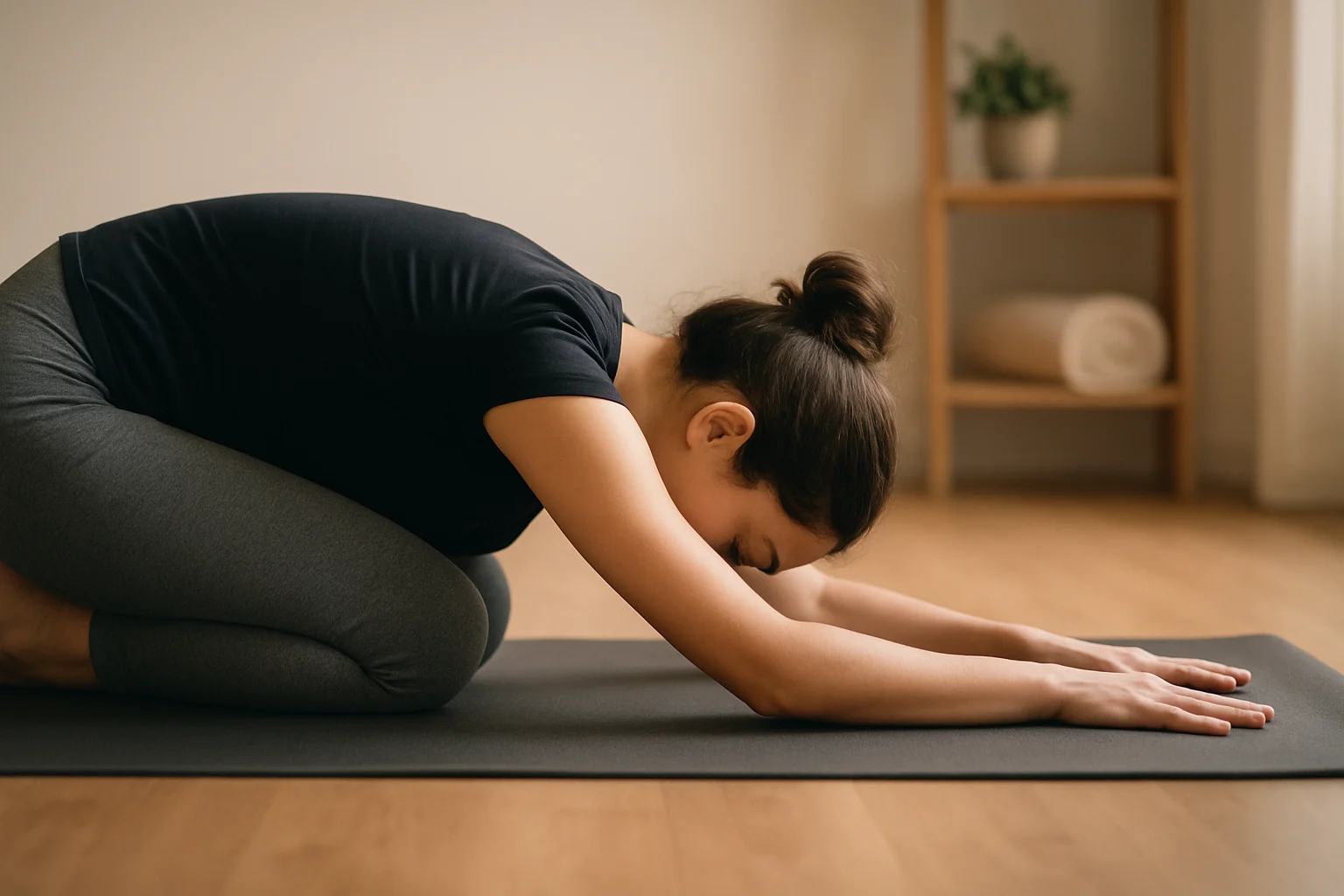
4. Knee-to-Chest Pose (Apanasana) (Yellow/Green)
Why it helps: This pose decompresses the spine and stretches glutes, relieving tension—an easy add-in for a beginner-friendly flow.
How to do it:
- Lie on your back, legs extended.
- Inhale: Draw your right knee to your chest.
- Exhale: Hug it gently with both hands.
- Hold for 5-10 breaths, then switch sides. Optionally, hug both knees.
Tips: Keep shoulders relaxed, spine long.
5. Supine Spinal Twist (Supta Matsyendrasana) (Yellow/Green)
Why it helps: This twist may help release tension in the spine and obliques, aiding lower back relief for beginner back pain yoga.
How to do it:
- Lie on your back, knees bent, feet flat.
- Hug knees to chest, then let them fall to the right, arms in a “T.”
- Keep shoulders grounded; look left.
- Hold for 5-10 breaths, then switch sides. 🥨
Tips: Use a pillow under knees if they don’t reach the floor.
6. Modified Bridge Pose (Setu Bandhasana) (Yellow/Green)
Why it helps: Strengthens glutes and hamstrings to help support the lower back—helpful for beginners.
How to do it:
- Lie on your back, knees bent, feet hip-width, heels near fingertips.
- Inhale: Lift hips gently, forming a line from shoulders to knees.
- Hold for 3-5 breaths, engaging glutes.
- Exhale: Lower slowly. Repeat 3-5 times. 🌉
Tips: Avoid over-lifting hips. Use a block under your tailbone for support.
Custom Beginner Routine for Gentle Back Pain Yoga
Build a custom yoga for lower back pain for beginners routine based on your comfort and time.
- Gray: Breath/Focus Pose
- Yellow: Intro-Level Stretch
- Green: Active Release/Stretch
- Red: Skip for Acute Pain
Your Suggested Routine:
💡 To improve your routine, try adjusting your comfort or time selection.
Sample Yoga for Lower Back Pain for Beginners Routine (10 Minutes)
Try this beginner-friendly yoga routine for easing lower back tension to fit into your day:
- Pelvic Tilts (2-3 min): Lie down, rock your pelvis, syncing with breath. (Gray/Yellow)
- Cat-Cow (3-4 min): Flow on hands and knees, warming your spine. (Gray/Green)
- Child’s Pose (2 min): Sink back, rest, and release your lower back. (Yellow)
- Knee-to-Chest (2-3 min): Hug one knee, then both, for decompression. (Yellow/Green)
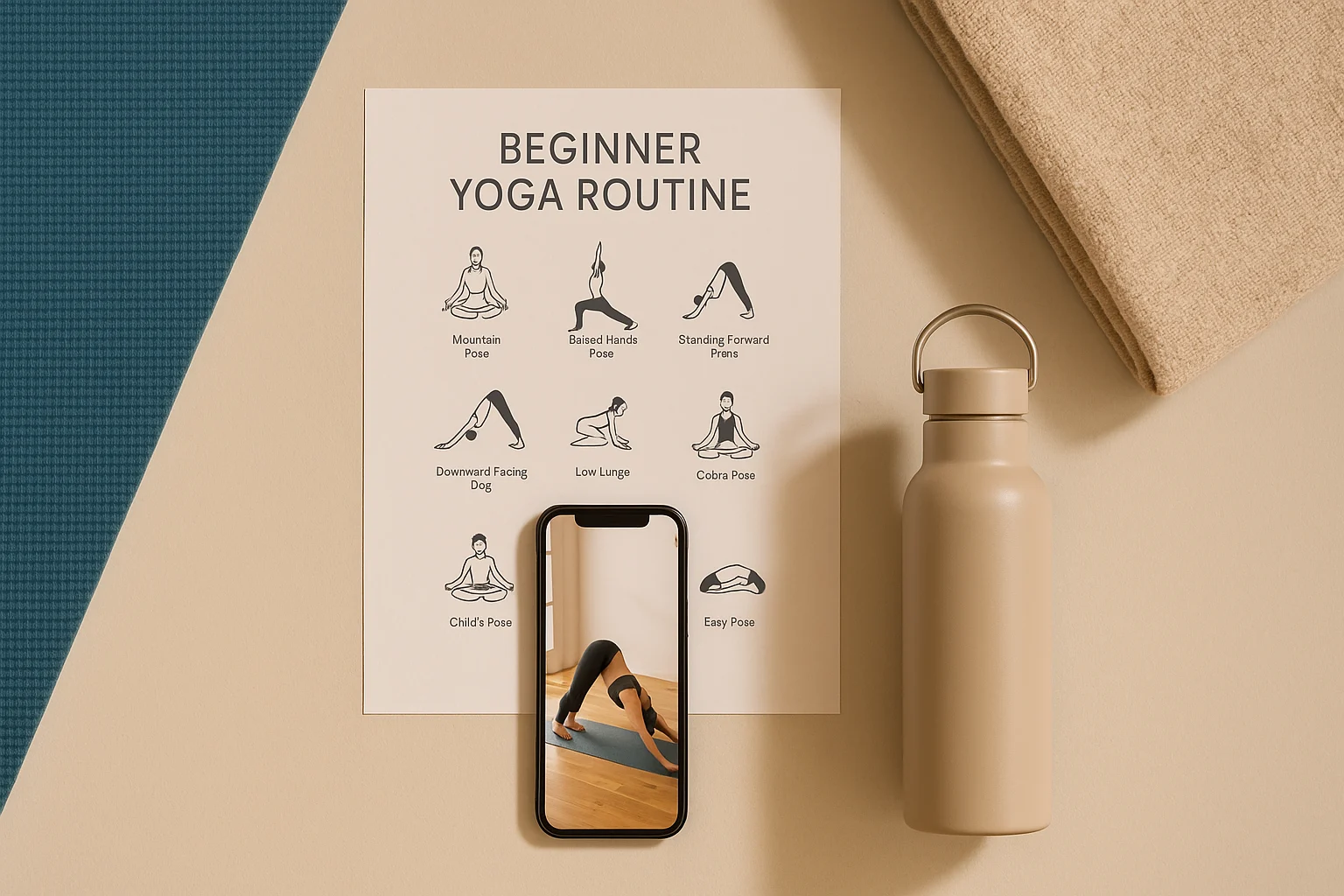
Progressing Your Yoga Practice
After 4–6 weeks of consistent practice, you may notice less stiffness and more strength. To progress with your beginner back-care routine, try:
- Extend Hold Times: Hold poses like Child’s Pose or Bridge for 10–15 breaths.
- Add Dynamic Poses: Incorporate gentle flows like Thread-the-Needle for deeper stretches.
- Join a Class: A beginner yoga class can introduce new poses under guidance.
Consistency Wins for Back Pain Relief
While one session feels good, regular practice is the key to lasting relief. For best results:
- Practice Regularly: Aim for 5–10 minutes, 3–5 times weekly.
- Build a Habit: Practice at the same time daily, like morning or bedtime.
- Be Patient: Celebrate small wins, like moving more freely.
When to Be Cautious with Yoga
These poses are generally safe for many people, but take care if you experience:
- Sharp Pain: Stop if you feel shooting pain or numbness.
- Acute Injury: Avoid yoga until cleared by a doctor.
- Specific Conditions: For conditions like sciatica, consider tailored poses found in yoga for sciatica relief and consult a professional.
Frequently Asked Questions About Yoga for Lower Back Pain for Beginners
Conclusion: Your Path to Relief
Starting gentle yoga for back comfort as a beginner is simple and encouraging. With a few beginner-friendly poses and steady practice, you’ll tune into your body, soothe discomfort, and grow stronger. Grab your mat, take a deep breath, and step into a more comfy, confident you! ✨

